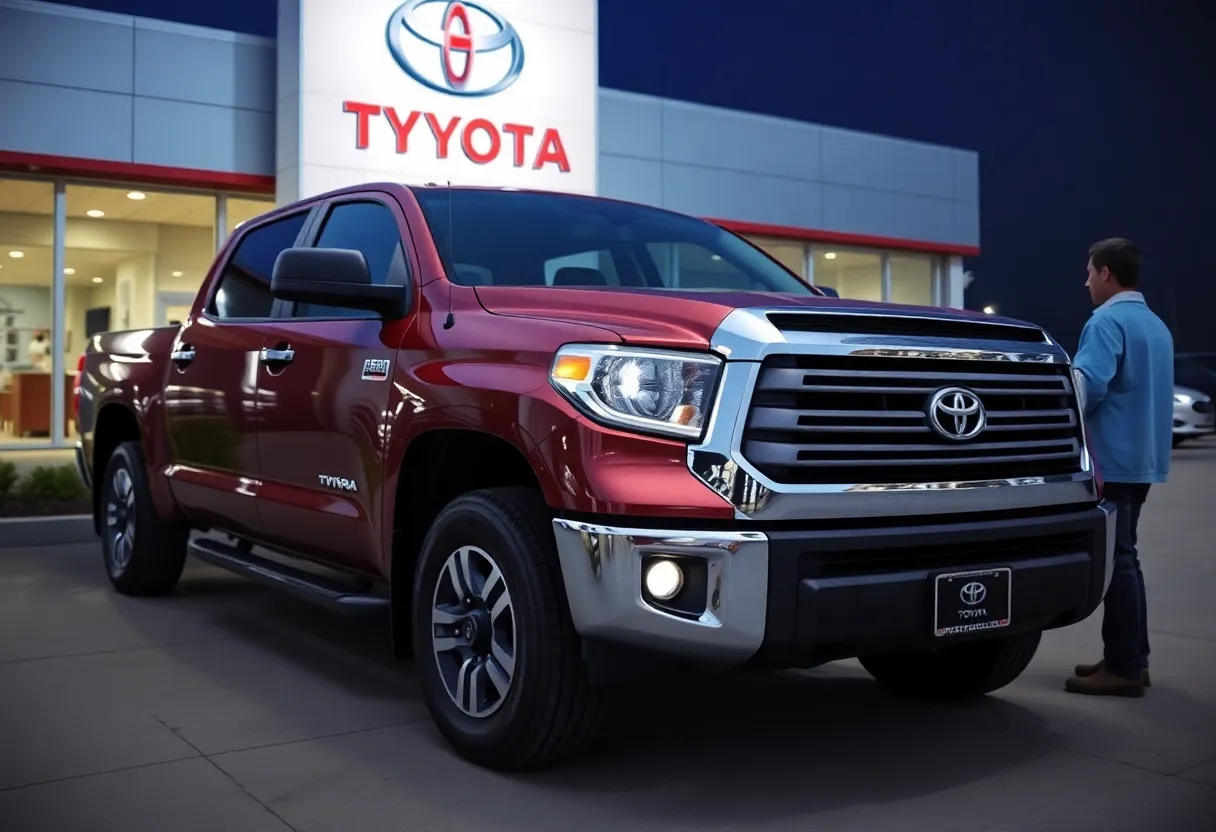News Summary
Toyota truck owners from the Huntsville plant have initiated a class action lawsuit due to a severe engine defect impacting the 2022-2023 Tundra models. This lawsuit, prompted by a recall affecting over 100,000 vehicles, aims to address safety concerns related to manufacturing debris in engines that may cause serious operational issues. Plaintiffs seek compensatory damages and believe Toyota’s recall response is inadequate, highlighting the challenges faced by dealerships in managing repairs amid increasing customer anxieties about safety.
Class Action Lawsuit Filed by Toyota Truck Owners over Engine Defect from Huntsville Plant
In a significant development last month, some Toyota truck owners have taken matters into their own hands by filing a class action lawsuit. This lawsuit is aimed at addressing concerns over a serious engine defect affecting the much-loved Tundra pickup. The engines in question were manufactured at Toyota’s plant in Huntsville, Alabama—one of the major production sites for the company.
Details of the Lawsuit
This legal action has made its way to the U.S. District Court in Vermont, where three individuals have come forward as plaintiffs against Toyota Motor North America. The lawsuit comes on the heels of a recall issued in May 2024 that affects several models, namely the 2022-2023 Toyota Tundras, Tundra hybrids, and Lexus LX vehicles.
The recall was initiated due to a defect associated with the V35A engine, which has been reported to house some manufacturing debris inside. This unwanted debris can lead to very serious concerns, including the possibility of the vehicle stalling even while the gas pedal is pressed or, quite alarmingly, surging unexpectedly. These conditions certainly raise eyebrows and questions about safety.
Potential Dangers and Recalls
What makes this situation even more concerning is that the defect may culminate in a variety of issues. Reports indicate that the affected engines could exhibit knocking sounds, rough running, and potential loss of motive power, which poses an increased risk of crashes, especially at higher speeds. The lawsuit warns about the possibility of catastrophic engine failure, something that no driver wants to experience.
To address these concerns, Toyota has stepped in by offering a complete engine replacement to all impacted owners, free of charge. This is a generous move, considering that the recall population is quite substantial, totaling around 102,092 vehicles, with a whopping 98,568 of those being Tundras.
Challenges for Dealerships
However, it’s not all smooth sailing. Dealerships are grappling with the logistics of managing an influx of recall-related business while also tending to their usual customer workloads and ongoing warranty services. These challenges could lead to longer wait times for owners seeking repairs, which might exacerbate their frustrations.
Plaintiffs’ Concerns
The plaintiffs involved in the lawsuit claim that Toyota’s response to the recall is insufficient. They argue that the company is still in the process of developing a reliable remedy for the defect, leaving many drivers anxious about the safety of their vehicles. Additionally, while some hybrids were initially excluded from the recall due to their powertrain systems, owners still feel the burden of driving cars that could potentially malfunction.
This predicament has led many to feel cornered, as they continue to operate vehicles that they believe might endanger their safety, with no clear timeline for a resolution in sight.
Seeking Remedies
The lawsuit doesn’t just stop at seeking acknowledgment of the problem. It aims for compensatory damages as well as restitution, hoping to hold Toyota accountable and push for a more immediate solution. Beyond the pressing engine issues, the case also tackles claims of consumer fraud and breaches of implied warranties, which could have significant implications for the automaker.
Wider Impact
The National Highway Traffic Safety Administration has reported that the recall involves not only the Tundra but also certain Lexus LX models that were manufactured with engines from the Huntsville plant or Japan. Interestingly, an earlier recall notification was sent almost two months after the recall was initially announced, leading to further dissatisfaction among consumers who have been eagerly awaiting solutions.
As this lawsuit unfolds, it serves as a stark reminder of the complexities involved in automotive manufacturing and the assurance of safety that every driver deserves. Whether Toyota can effectively address the concerns of its customers and restore confidence remains to be seen, but the voices of affected owners are becoming increasingly difficult to ignore.
Deeper Dive: News & Info About This Topic
HERE Resources
Additional Resources
- AL.com: Class Action Lawsuit Filed by Toyota Truck Owners over Engine Defect
- Montgomery Advertiser: Class Action Lawsuit Filed Over Huntsville-Made Toyota Engines
- AL.com: Mazda Considers Shifting Production to Alabama Plant
- Wikipedia: Class Action
- Google Search: Toyota Engine Defect Lawsuit








